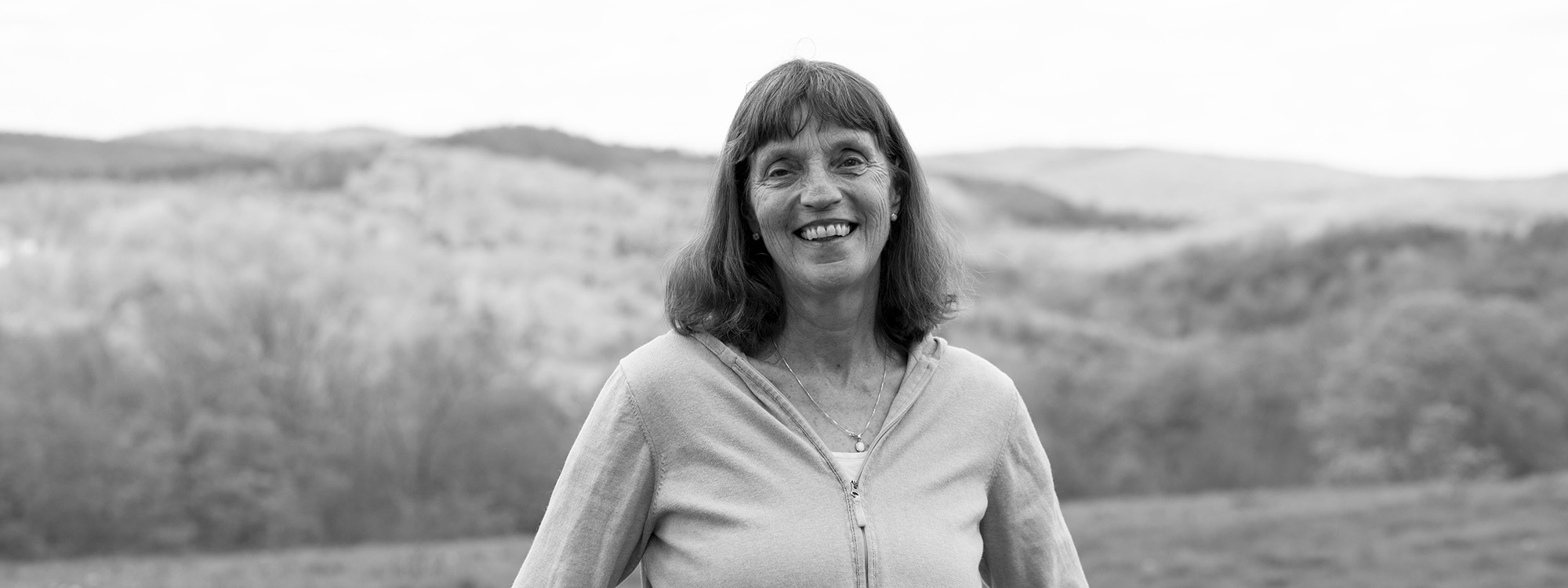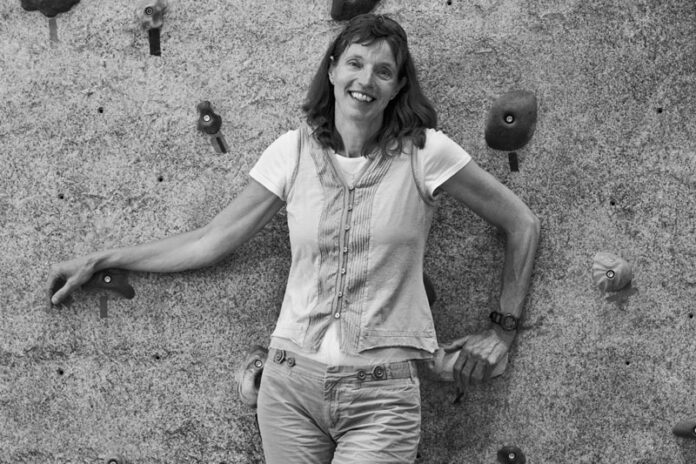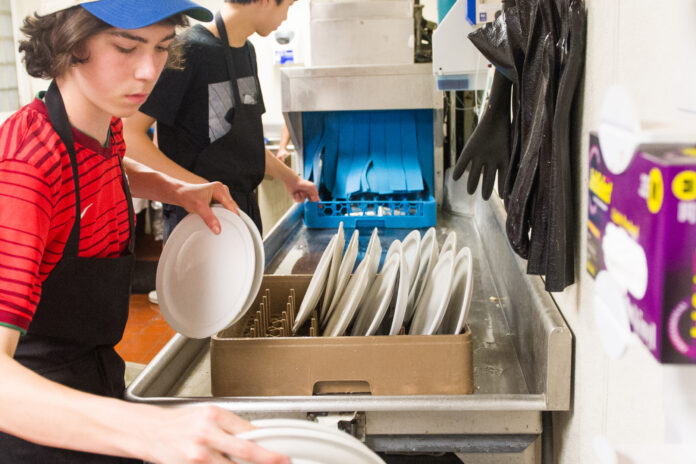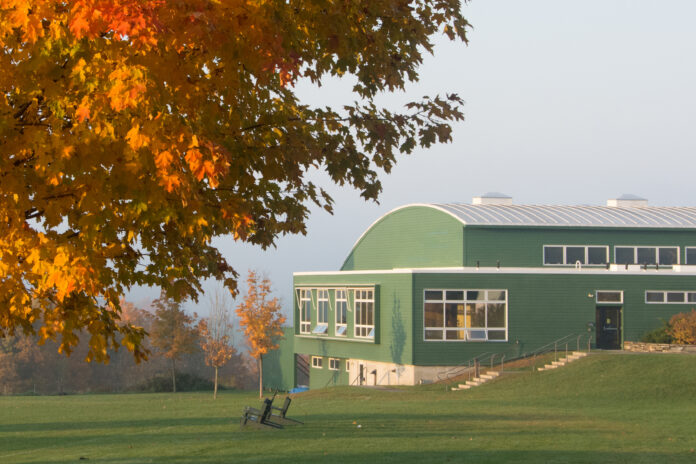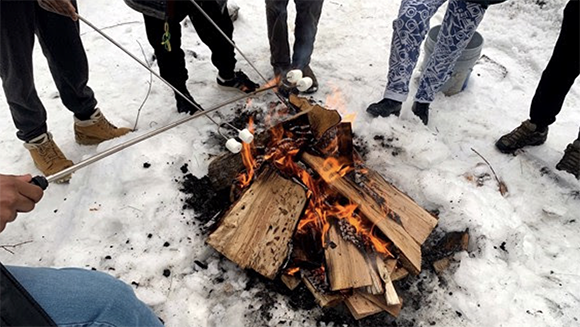History Teacher, and Director of Work Program, Afternoon Activities, to Retire After 41 Years
In 1980, Lies Pasterkamp left the Netherlands and arrived at The Putney School with all of her belongings tucked in her bike pannier. Randy Smith, assistant head of school and CFO, recalls the photo of her when she was first hired as an intern.
“She was this little Dutch girl,” he said. “You can just hear the wooden shoes.”
She appears bright-eyed and ready for adventure, with a child-like braid trailing over her shoulder. But please don’t mistake her for naive.
She’s a force,” Smith said. “Always has been, always will be. When it comes to The Putney School she’s been primarily a force for good. Because powerful people can sway institutions.”
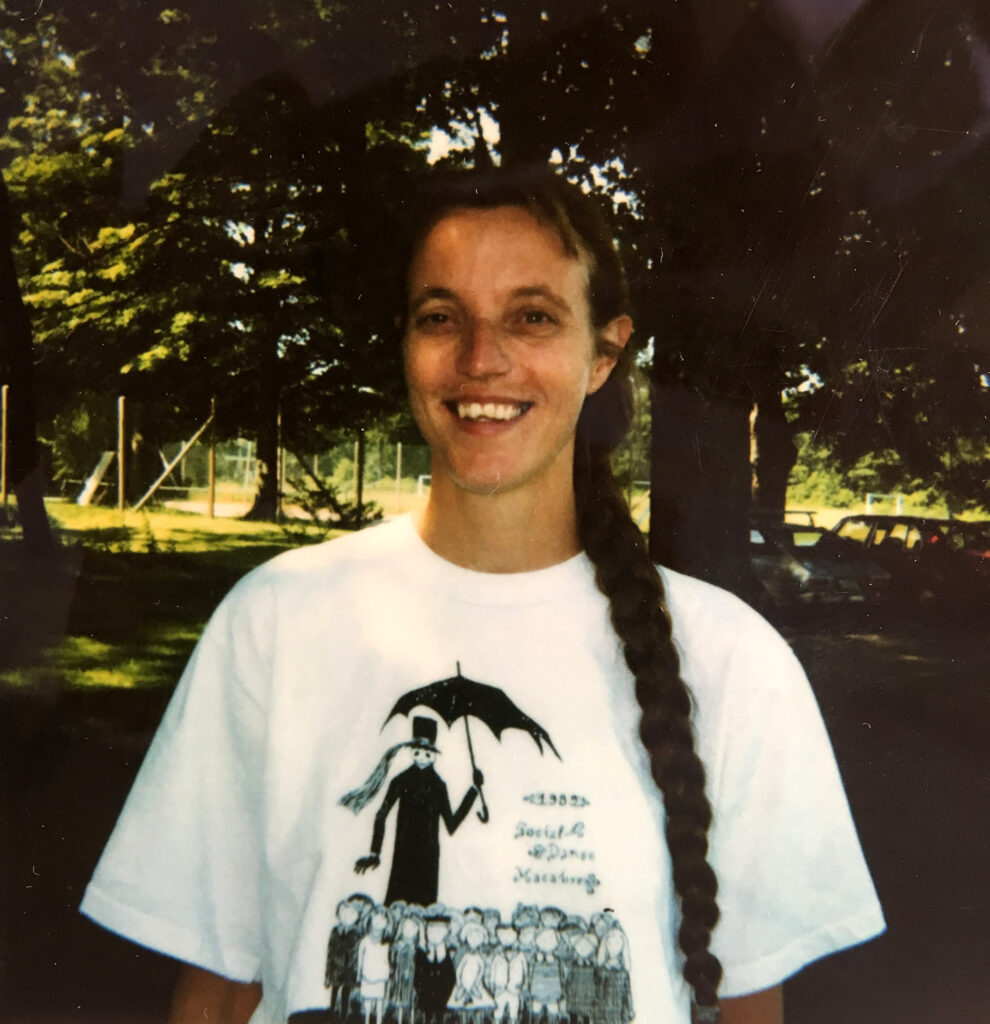
Her influence is unquestionable. Without Pasterkamp, the Field House would not be what it is today. Without Pasterkamp, the trail system would not have been expanded, mapped and maintained the way it is now, complete with Lies’s Loop, a 5K trail named in her honor. Without Pasterkamp, students would not have encountered her strong work ethic, and graduate with it ingrained in their hearts as they head out into the world.
What would The Putney School be like without Pasterkamp?
We’ll soon find out.
“It has been an amazing ride,” Pasterkamp wrote in an email to the school community. “I did not think I would be ‘a lifer,’ but somehow life happens and here I am 41 years later. It is now time, however, to explore life after Putney.”
She will retire at the end of the school year, ready for a new adventure. She plans to visit friends and family back in the Netherlands, focus on her volunteer work in conflict resolution at the Brattleboro Community Justice Center, and pursue the trips she’s been dreaming about, such as biking in New Zealand, and hiking in Nepal.
“The brush with mortality from this whole past year from the pandemic made me realize life might be shorter than I realized,” she said. “It’s always better to retire a year too early than a year too late.”
In her time at Putney, Pasterkamp says she has “served under six heads of school, lived in seven apartments on campus, taught 9th, 10th, and 12th-grade history courses, directed the Evening Arts, Afternoon Activity and Work programs, took students to France and Holland for studies abroad, covered many dorms, ran activities of all sorts and did a myriad of other tasks including chairing the personnel policy committee, organizing Long Fall, and being a faculty trustee.”
But that’s just on paper.
“Moreover, many of the big moments in my personal life happened at Putney,” Pasterkamp said.
Her wedding, for instance.
No media items found.
Photos clockwise: Pasterkamp with colleague Maddy Wegner during a 1984 social dance photoshoot | Pasterkamp collecting maple syrup at Putney | At the 1980 Harvest Festival parade representing the Old Girls dormitory | Pasterkamp at Putney | Pasterkamp and students on a Long Fall trip in 1982
‘I Do’
Pasterkamp began her internship doing room inspections every morning, driving a truck from the paint shop down to the dorms which at the time were spread out in the lower farm.
“Very quickly they found other things for me to do,” she said.
Putney provided her with room and board, but not a paycheck, so she “found a place to earn some cash” next door at Green Mountain Orchards. That’s where she met her future husband, Paul. They bonded over harvesting apples and a love for contra dancing.
Two years later as she was waiting to hear back about her visa, immigration officers made a surprise visit to the orchard. She and another woman were warned at the gate.
“We hopped the fence and hid at The Putney School,” she said. After narrowly escaping the raid, she found herself talking to Paul:
“Since Paul and I had already become quite close, we kind of cooked up the idea — well it was more romantic that than — but maybe we should get married and that would solve the problem.”
Jeffrey Campbell, who taught English and theater for nearly 30 years, resided at Putney during his retirement. He could always be found in the back kitchen where faculty gathered for coffee or a meal.
He also happened to be a Unitarian minister.
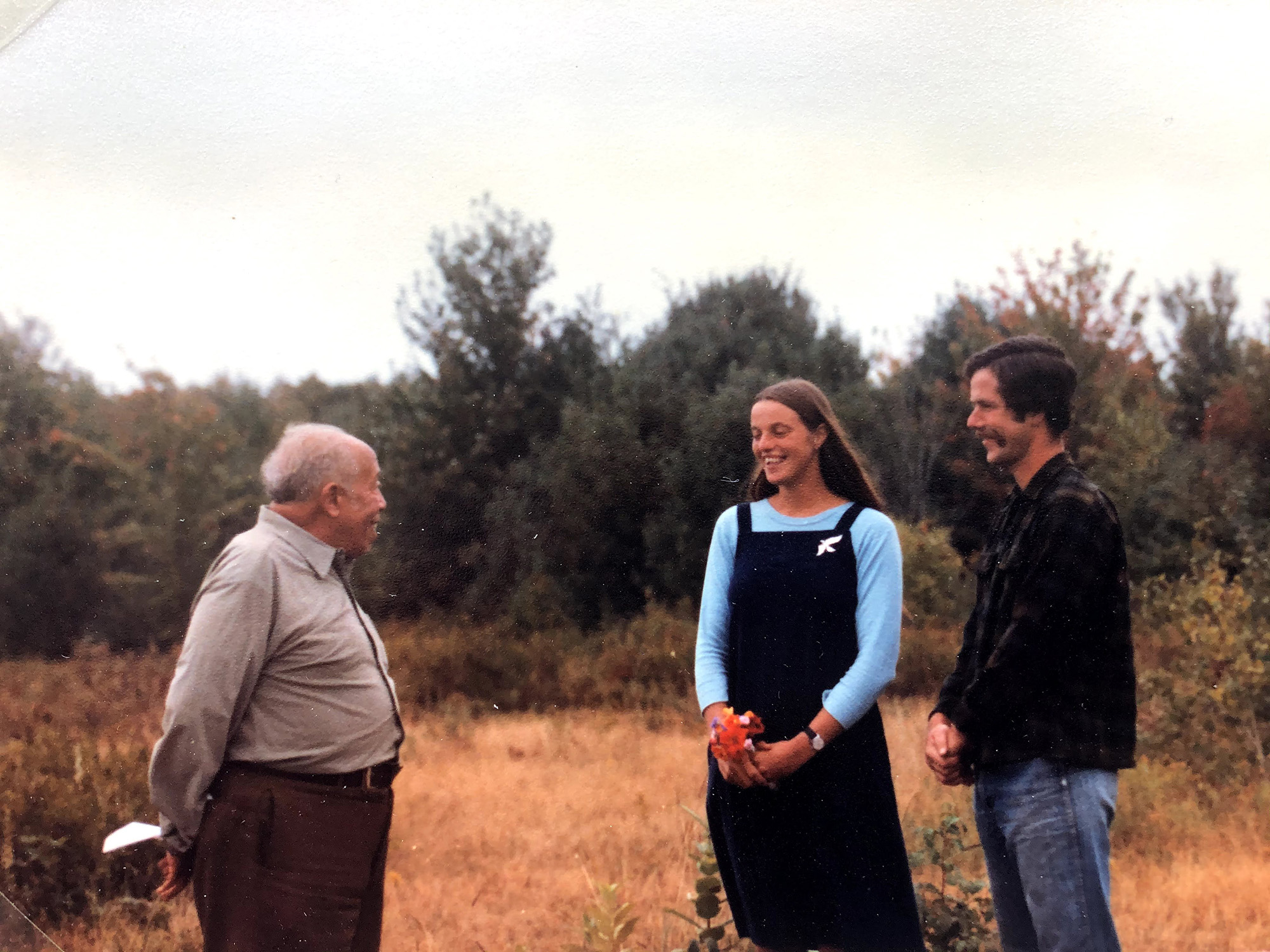
On September 22, 1982, Pasterkamp and Paul found him sitting at one of the three round tables, eating his infamous burnt toast. They approached him and asked if he would marry them.
“Before lunch or after lunch?” was his quick-witted response.
“We said, well maybe after lunch would be okay,” Pasterkamp said.
Before the sun set that day, they marched halfway up Putney Mountain to Frost Pasture, overlooking the campus. Campbell, over 80-years-old at the time, had no problem hiking up to the ceremony spot. In one hand he held a big cake he had asked the chef at Putney to bake for them. In the other, a beautiful stained glass window as a gift.
“His booming voice for a wedding party of five — Paul, me, two friends, and a dog — echoed from the valley below,” Pasterkamp said. “It was very memorable!”
A Force in Action
To say Pasterkamp will leave behind a life full of memories at Putney is an understatement. She will leave behind a legacy. She has taught history to generations of students, and has run afternoon activities for years, but it is in the work program that she has put her most lasting mark on the school and its students, said Head of School Emily Jones.
Dozens of schools have visited Putney to learn how to create a work program, but they can’t make it real,” Jones said. “In other schools it doesn’t come first, but has to be scheduled around all other commitments. Through many changes of academic schedules, Lies has made sure that getting the work done when it needs to be done comes first here, and that has made all the difference.”
Supervising the daily jobs of 230 students has not been an easy task. It could be frustrating at times. But every year, Pasterkamp has made it a point to meet with each student individually. She tries to instill in them an understanding of their role as stewards of the school—that they are a key piece in the maintenance of their physical surroundings.
As Smith puts it, “At Putney, nobody comes up behind you. If you don’t milk the cows and know how to do it, there’s going to be a problem. If you don’t help in the kitchen the right way, the food is not going to come out on time. We don’t have adults. We have kids who are responsible for certain tasks. Lies has overseen that, and has been incredibly protective of that component of the school.”
It’s incredibly rewarding, she says, to see students not just taking their jobs seriously, but embracing a sense of pride in their obligation to keep the school running.
“It’s preparation for life rather than just college,” she said. “That’s something I hope I have been able to contribute to.”
Working with students has also helped keep her young, she says. Whether she’s teaching them in a classroom, or hiking with them in the White mountains, “the enthusiasm and energy that they bring really is inspiring.”
“The immediacy of being surrounded by the students and their tremendous creativity. I’m always blown away by what they bring,” she said. “I’ll also really miss the camaraderie with my peers — my fellow employees and teachers.”
No media items found.
Photos clockwise: One of the many work afternoon activities Pasterkamp has overseen | Profile image of Pasterkamp | Pasterkamp and students on a trimester abroad in France | The Field House | Students cross country skiing on The Putney School trails | Pasterkamp, who served as an assistant coach for the rowing team
Throughout their time at Putney, Pasterkamp and Smith have become close friends. But it doesn’t mean she’s always made his life easy.
“She has a very powerful sense of community right,” Smith said. “I don’t always agree with her, but at least I know where she’s coming from.”
As the chief financial officer at Putney, he remembers his role as project manager when the Field House was being built.
As a faculty trustee, Pasterkamp strongly advocated for an indoor space for afternoon activities, and fought for its construction. She was a firm believer in the importance of the outdoors, but saw the benefits of having a dedicated space for activities such as weight lifting and basketball that don’t lend themselves to environment, as well as having a place to go in inclement weather.
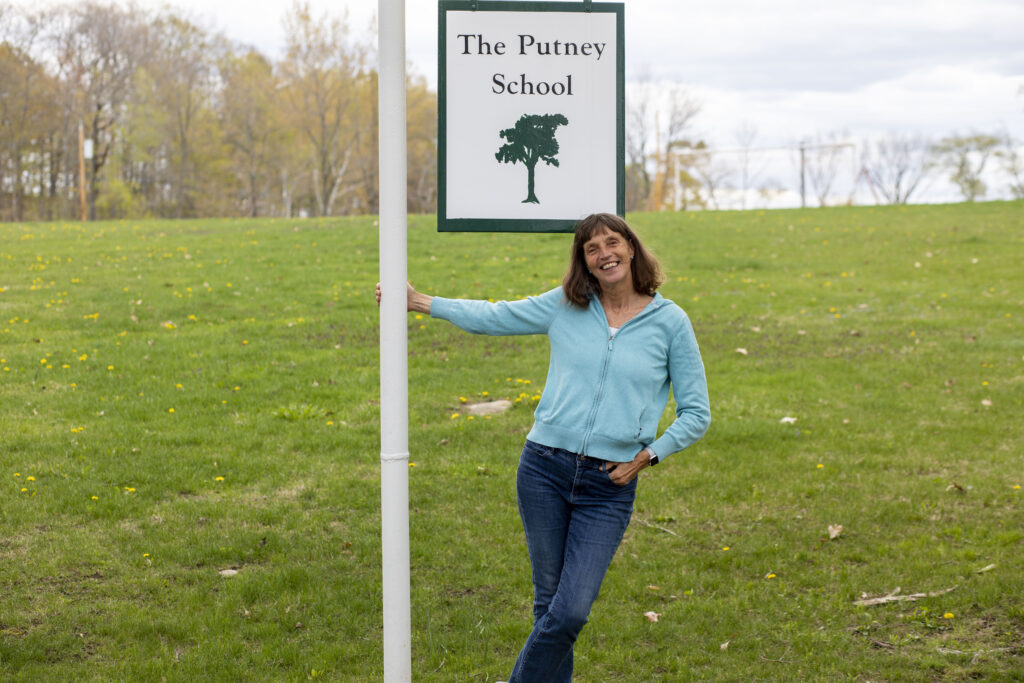
“Clearly our winters are not necessarily always filled with snow the way we want them to be,” she said. “Also with a greater diversity in our student body, we needed to look at the interest of all students.”
Prior to the construction of the Field House, activities were scattered around campus. There was rock climbing above the cow barn, and pickup games of basketball or volleyball wherever students could find a spot. The Field House allowed Putney to bring these activities together all in one place, Smith said.
“Lies was very much involved in the process for which the facility itself was designed — where we were going to put it on campus, and what activities we were going to put in,” he said. “She was there every step of the way.”
She may be retiring but that doesn’t mean she’ll be gone, he speculates, staring at her house on the edge of campus from his office window. She’s not one to let her legacy slide.
“I’m absolutely sure that come first snow next winter, I’m going to get a call from Lies Pasterkamp wanting to know when the trails are going to be groomed,” he said. “And I wouldn’t have it any other way.”


